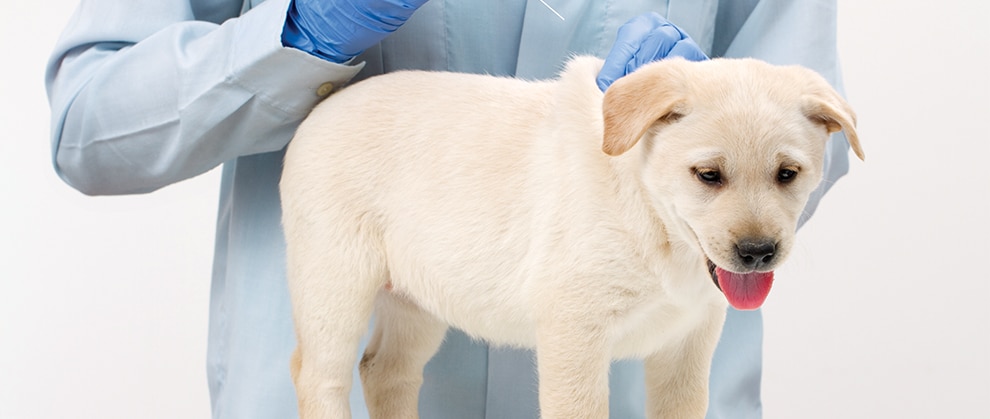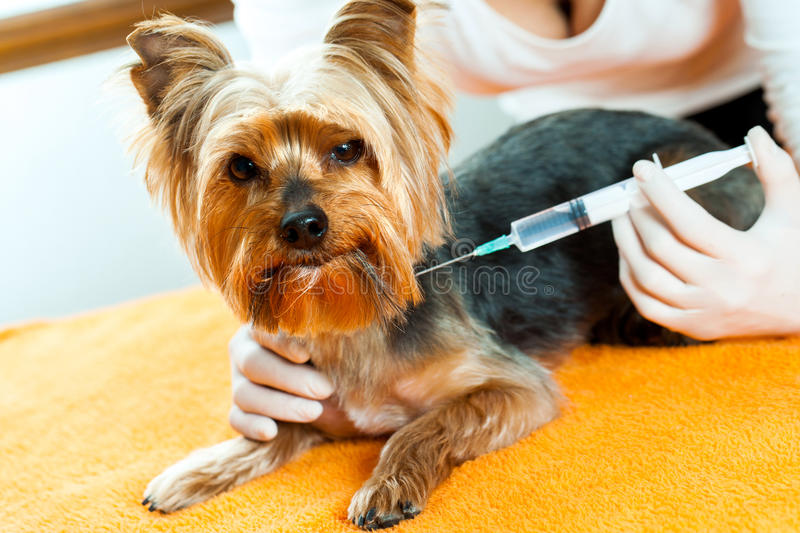Handbook of vaccination for dogs is it okay to vaccinate late, necessary vaccinations for dogs and note when vaccinating dogs.

When bringing a dog home, you always need your attention and care. Ensuring a good diet and providing your dog with a warm place to sleep every day is essential. Besides, vaccination for small dogs in the first years of life is also essential. Still, sometimes we forget the vaccination schedule for dogs, so is it okay to vaccinate late?
Is it okay to get vaccinated late? Reasons you should not vaccinate your dog late
-
Vaccinating your dog helps protect your dog from some particularly dangerous diseases such as Care, Parvo, and respiratory infections.
-
Sen avoids expensive treatments because of low rates of dog infection after vaccination.
-
Furthermore, vaccinating your dog also means that you are protecting our community from communicable diseases like rabies.
-
Vaccinating dogs help them to increase their immune system, and develop a more comprehensive resistance, especially for dogs in the developing stage.
Necessary vaccinations for dogs
Care injections for dogs
Care is a virus that seriously affects dogs’ respiratory tract and central nervous system. Care disease in dogs is transmitted through contact with bodily secretions. Or indirectly, such as contact with contaminated utensils, food bowls, toys, and utensils. Infected dogs will have symptoms of moodiness, loss of appetite, high temperature, red eyes, runny nose, blue eye discharge, diarrhea, and weakness. Vaccinate dogs when they are 8 weeks old, doses 2 and 3 should be given to dogs at 10 and 12 weeks.
Parvo vaccine for dogs
Parvo disease in dogs is traditionally transmitted through feces, food, water, or objects of infected dogs. When dogs are infected, they often have symptoms such as loose, bloody stools with a fishy odor. Dogs will become dehydrated very quickly. This is followed by convulsions, which can be life-threatening. Vaccinate dogs when they are 8 weeks old, doses 2 and 3 should be given to dogs at 10 and 12 weeks.
Hepatitis injection for dogs
Hepatitis is transmitted through food contaminated with pathogens from the feces, urine, or saliva of an infected dog. Dog disease often has symptoms such as anorexia, moodiness, fever, fatigue, red eyes, and low white blood cells. Dogs may show unusual symptoms such as blood clots, and an enlarged abdomen. Some of the deaths were due to severe disease progression. Vaccinate dogs when they are 8 weeks old, doses 2 and 3 should be given to dogs at 10 and 12 weeks.
Rabies shot for dogs
Rabies causes encephalitis in dogs. This is one of the few diseases that owners can get from their dogs. The disease is transmitted from the saliva of an infected dog through open wounds. This is an infectious disease that can spread to humans and is life-threatening. Infected dogs will have abnormal neurological manifestations. The disease is divided into 2 stages: stage 1 is aggressive, and stage 2 is polio.
When the dog is sick in stage 2, there will be symptoms such as fatigue, paralyzed muscles, and stiff jaw muscles, making the dog unable to eat and drink. People often call the disease “fear of water”. Dogs already infected with rabies cannot be unable to schedule dog vaccinations and treatment. The disease has no specific treatment, only support according to the condition. People infected with rabies also have symptoms similar to those in dogs.
Rabies vaccine should be given to puppies when they are 12 weeks old. A second dose should be given to them when they are 6 months old.
Why should dogs be vaccinated on the right day?
Puppies need to be vaccinated with the first dose before 16 weeks of age. The earliest is at the age of 35 days (applied to the nose of 2 diseases), 45 days of age (applied to the nose of 5 diseases), and 2 months of age or more (applied to the nose of 7 diseases). And the 2nd injection is 21 days after the first injection. The 3rd injection is 21 days after the 2nd dose. Complete 3 doses of vaccination before adulthood is 1 year old to ensure the best vaccination effect.

Note: you need to know the injection schedule to inject on the right date, if it is wrong, it will lead to many other risks for your dog and the medicine will no longer be as effective and effective as the original. Viruses, bacteria, and parasites can still invade and harm your dog.
Notes you need to know when vaccinating your dog
Vaccinating your dog on the right day helps keep them healthy and prevents many diseases, but you also need to note a few things below to avoid a bad case when vaccinating your pet.
-
Dogs should not be vaccinated when they are in poor health, especially when they are infected with diseases or internal parasites. Make sure the dog is in good health and then give it a vaccination.
-
You should take your pet to a veterinary clinic or hospital for proper advice and vaccination, and take action if they have a reaction to the drug or anaphylaxis.
-
After the injection, it is necessary to take better care of the dog, abstain from bathing; Abstain from foods containing a lot of fat, milk, and fishy foods for at least 1 week.
-
You should follow your veterinarian’s instructions when vaccinating your dog because only a doctor can really understand your pet, so arbitrary injections will not have any effect or even affect the health of your pet. they.
Today’s article has answered for you the problem of late vaccination, and why you should vaccinate your pet. Hope this article has provided you with the necessary knowledge so that you can take care of and vaccinate your dog on the right day.